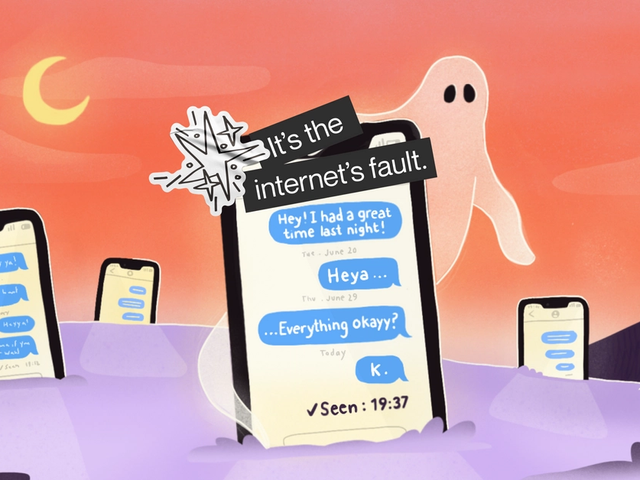
This is the first article in a series about how the internet has changed or is changing pretty much everything. We owe a big thanks to Club Sexu—a non-profit that does what they need to do to get us talking about sexuality in a more positive, playful and inclusive way. (Even if that means writing blog articles!) So, THANK YOU!
SMS: Hey! I had a great time last night!
SMS: Heya…
SMS: … Everything okaaayyy?
SMS: Hey, you! No news is good news! Are you free tonight for a drink?
SMS: You know you can let me know if you’re not into me, right?…
SMS: K.
Casper, Tinder & the haunted screen
These days, ghosts no longer haunt the creepy cellars of abandoned houses or gloomy cemeteries dimly lit by the full moon’s golden glow. Nope. Instead, modern ghosts can be found lurking behind our screens, basked in their pale, ever-present blue light. Conspicuous by their absence and becoming increasingly translucent over time.
On nights during which a blood-red moon renders everything it touches eerie and where the silence is broken by the sound of Fireball shots being clinked together, the ghosts of today come back to haunt us in the wee hours of the morning with a “U up?” glowing on our phones.
Sound familiar? These “ghosts” come in all shapes and sizes. Any of us could be one; you, me, a neighbour, a friend. Yep, many of us have been someone’s Casper!
With the advent of dating sites, social media, and many other social apps, “ghosting” has crept into the lives of human beings connected through the World Wide Web. Even our professional relationships haven’t been spared, the pandemic having exacerbated this phenomenon by suspending in-person work.1 Ghosting—the practice of ending a relationship by swiftly cutting off all communication without warning nor explanation and by ignoring the other person’s messages—first appeared in the English dictionary in 2015, though it’s been around for longer than that.
A lot of people see ghosting as specific to the “Tinder generation”, aka to those of us who came of age when virtual dating became a thing. But in reality, “ghosting” is probably prevalent across ages, simply because today’s technology makes it so easy. Though if you think about it, it was probably pretty easy to straight-up ignore a wax-sealed letter sent by a suitor from a distant kingdom in 1654. But that’s another topic for another time.
While I wouldn’t blame you for thinking that “ghostees” are the only victims of this sketchy practice, studies have surprisingly shown that “ghosters” can also be left with a heavy heart. (For real!)
According to Freedman and Powell (2022), while “ghosters” and “ghostees” describe their experiences in negative and positive terms, “ghosters” are apparently more likely to express guilt and relief, and “ghostees”, feelings of sadness and hurt.2
Exacerbated by the digitization of relationships, this form of breakup—or rather a lack thereof—can hurt the people who experience it. So, what are we waiting for? Let's grab our proton packs and go ghost hunting! #ghostbusters
An “end” that leaves you hungry for closure
Ghosting has become the ultimate symbol of virtual rejection. It’s a recipe for negative emotions, assumptions, misunderstandings, and a loss of predictability. By nipping a story in the bud, ghosting tip-toes around a discourse of disappearance. Something is here one moment, and gone the next. In the blink of an eye.
Faced with a foggy, grey area to fill, the mind begins to race and spiral out of control: “What did I do? Did I say something wrong? Am I ugly? Was there an unusually large piece of kale stuck in my teeth during our date?” And on, and on… and on.
Ghosting leaves a void that we do our best to ignore while we keep hoping, imagining, and crafting our own ending to the story. Ghosting forces us to become novelists of our own lives. And, as it turns out, it's exhausting to write hundreds of versions of the same story. Take my word for it. And yet, the reason why we were ghosted might not even have anything to do with us!
As Club Sexu’s sex researcher and consultant, Sara Mathieu-Chartier, says, the most illustrative example of this is the "love-hate" relationship many of us have with dating apps: we simply delete them whenever we start to hate them. And we often do this without warning, ghosting anyone we’ve been chatting with in the process. Even after having gone on a date, a person’s reasons for suddenly “disappearing” into thin air might have nothing to do with us (an old flame coming back in the picture, moving to another country, etc.). Regardless, many of us tend to take things personally.
Inevitably, the online world, including social media dating apps, are fertile grounds for ghosting since they facilitate anonymity, physical distance, and disengagement. The internet allows us to avoid directly witnessing the emotional impact our vanishing act has on the other person. Plus, ghosting is normalized in everyday conversation.
But one question lingers: is ghosting ethical? Or more bluntly: is ghosting an unempathetic cheap shot?
“Anyway, it’s not like we owed each other anything.”
We’ve all heard that line before. I find the idea of not "owing" a person anything intriguing. As if our modern social and romantic contracts, undermined by an individualism amplified by our digital lives, have reduced our relationships to fragile interactions guided by our desires, our mood, and by our laziness.
Don’t get me wrong. It’s completely normal NOT to write an elaborate goodbye letter to Sam who greeted us with an unsolicited pic of his scrotum, or to explain to each and every sender of “Hey :)” on Tinder why we don’t want to continue our quest for "the one" with them. We have to protect our mental health by investing our time and energy in the right people and relationships.
A 2019 study in the US suggests dividing ghosting scenarios into four main categories: short-term, long-term, gradual and sudden.3 A person who suddenly “ghosts” in the short term, for example, might stop replying to our messages all at once, but come back to us a few weeks later.
But a little empathy and goodwill toward the people we’ve started “something” with can go a long way when we decide to approach them with openness and transparency. Putting yourself in their shoes could help you better understand the potential impacts ghosting could have on them and motivate you to end the conversation and provide closure. Even if you keep it short and sweet.
Here’s an example you can borrow (you’re welcome!): “I don’t want to leave you hanging. I had a lovely time with you, but I don’t feel there’s enough chemistry between us for me to want to see you again. Take care.” It’s clear and direct. So, copy and paste away!
On the flip side, if you’re the one who’s being ghosted, keep in mind that the other person’s silence probably comes from a combination of social norms, procrastination, and circumstances that probably have nothing to do with you. I’m not saying it’s easy, but keeping these things in mind can help you let go and move on.
*
Redundancy alert! Personally, I think that something authentic is shared, a connection is created, and something is "owed" to each other as soon as you begin a story with someone, whether that story is long- or short-lived. And when it ends, that “owed” something is the “luxury” of closure; not becoming a ghost.
Owing someone - even yourself - something sounds radical, right? Maybe because it clashes with our society’s individualist values. But maybe this proverb will help: “Because I opened up to you, and you to me, let us promise not to haunt each other.” As André Breton said - an actual ghost #RIP: “Who am I? If this once I were to rely on a proverb, then perhaps everything would amount to whom I 'haunt.'"4
Club Sexu (and of course all of us at oxio) would like to give a shout out to: Justin Roy, Copywriting. Sara Mathieu-C, Annotation. Rosalie Lemire, Illustration. Léa Séguin, Editing and translation.
- Carlin, G., & Powers, S. (2021). “Ghosting” and its Impact on Professional Communication
- Freedman, G., Powell, D.N., Le, B. et Williams, K.D. (2022). Expériences émotionnelles de ghosting. Le Journal de psychologie sociale, 1-20.
- LeFebvre, L. E., Allen, M., Rasner, R. D., Garstad, S., Wilms, A., & Parrish, C. (2019). Ghosting in emerging adults’ romantic relationships: The digital dissolution disappearance strategy. Imagination, Cognition and Personality, 39(2), 125-150.
- BRETON, André. Nadja, Paris, NRF, 1928.







